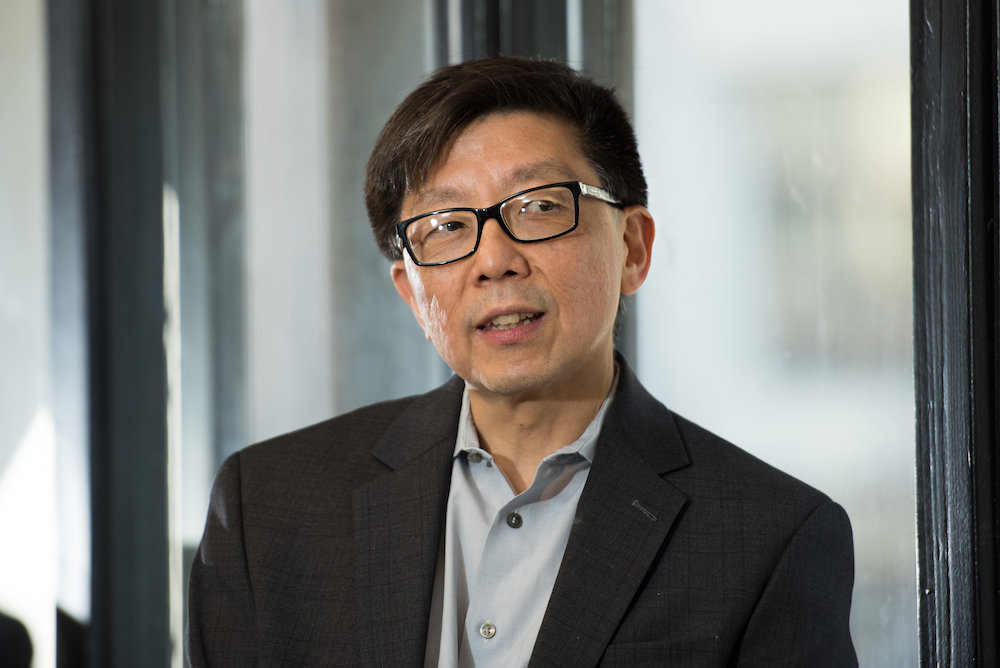
Photo by Beth Baugher.
Foon Rhee is a columnist and an Associate Editor of The Sacramento Bee. Before moderating a Zócalo/The California Wellness Foundation panel discussion titled “What Can California Teach America About Immigrant Integration?” at the Capitol Events Center in Sacramento, he spoke in the green room about his high school English teacher, interviewing an unsung Civil Rights leader, and growing up in Korea, England, North Carolina, and Ohio.
How did you decide to become a journalist?
I worked on my high school yearbook in Columbus, Ohio, and I enjoyed it. And I remember we went to a competition at Kent State, I think it was, and won some little award, and I thought, ‘OK, maybe I’ll [keep doing this].’ And then I worked at my student newspaper at Duke. That’s when I really decided that I wanted to become a reporter.
How did you end up in Sacramento?
Family, basically. I’ve worked in North Carolina, Boston, and then I came out here in 2010 to be closer to my mom and my sister, who lived in Oakland.
Was there a teacher or professor who really influenced you?
My high school English teacher, Mrs. Richmond. She was my favorite teacher, and she encouraged my love of writing. So she was really important. And then in college I majored in history and there were two oral history professors, William Chafe and Sydney Nathans. Oral history in a lot of ways is just like reporting: You’re going out and talking to people. I was really interested in the Civil Rights Movement of the 1960s, so that’s what I did my senior thesis on. So they encouraged me on that.
What aspect of Civil Rights did you focus on?
The head of the Congress of Racial Equality, Floyd McKissick, I interviewed him for my oral history project. And he later founded this brand-new city in rural North Carolina called Soul City, about an hour north of Durham, and he got money from the Nixon administration. And a lot of the other Civil Rights leaders criticized him for selling out by supporting a Republican, and Richard Nixon at that. He was working on his autobiography at the time, so that’s why he talked to me, because it helped him remember, going all the way back to his childhood and the 1960s. And unfortunately he passed away before he could finish his autobiography. So if I ever did write a book I would probably try to write his biography. Because there are so many figures in the Civil Rights Movement who are really important, and a lot of them have been written about. He’s one that hasn’t been written about as much, and he’s sort of lost to history in some ways. And he was a little bitter that he didn’t get more credit, and that CORE didn’t get more credit.
You’ve still got a North Carolina accent.
Really?! Well, it comes out sometimes.
The panel you’re moderating is about immigration. What’s your own family’s immigration story?
So, I was born in Korea, moved to England when I was four, and moved to North Carolina when I was eight. I went back to Korea for a year, for seventh grade, and I was in Columbus from eighth grade on, until graduation. And then college at Duke and then newspapers since then. I remember I was in college when I got my citizenship. I remember driving up to Greensboro from Duke, and taking the test. I actually did a story for the student newspaper on the citizenship ceremony, while I was getting my citizenship.
What are your memories of those other places where you grew up?
I don’t remember very much about my first four years in Korea, but I remember everything in England. We lived in Leeds, in Yorkshire, which is northern, industrial. My older sister and I were the only Asians in our school. So in some ways I don’t think that we experienced direct discrimination or racism in any ways, because we were more novelties. And the same thing happened to us in North Carolina. This was back in the mid-’70s and there weren’t that many Asians yet in North Carolina, so we were novelties there as well. So I’ve had a different immigrant experience from many people who grew up in California, where there were lots of people like them in their neighborhood and all through their life. I’ve always been very much in the minority, everywhere I’ve lived—until I came to California.



